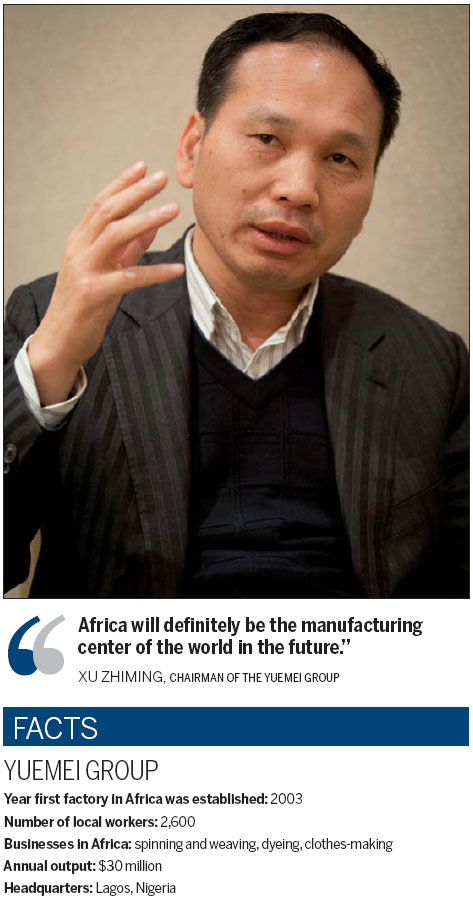Smart operator reaps rewards


A Chinese provincial sewing shop owner took a gamble on moving to Africa and quickly built a business empire there
Twenty-two years ago when Xu Zhiming started a small workshop sewing clothes in Zhuji, Zhejiang province, he saw his future close to home.
But his sharp business brain spotted greater opportunities in a place few Chinese then knew much about - Africa. Xu moved his business there well ahead of his Chinese competitors and now he has built up a strong presence on the continent.
Xu, chairman of the Yuemei Group, now does 40 percent of his business in Africa and the remaining 60 percent in China. He predicts that those numbers will be reversed in three to five years. The company's current annual output in Africa is worth $30 million.
"Africa will definitely be the manufacturing center of the world in the future," Xu says.
His latest acquisition in Africa has confirmed his confidence in this vast new market. He recently bought a cotton plantation in Mali which will soon supply raw materials for his clothes-making operations in Africa. Once the mill reaches its full capacity, it will cut the cost of raw materials by 50 percent.
Xu was born in 1964 in Zhuji, a county famous for its long history and high-quality pearls. For the past 2,000 years, it has also been one of the most prosperous counties in China. That prosperity has given people there a natural talent for business, and the area's proximity to the sea makes trading overseas much easier.
Growing up in such an area, Xu was destined to be a businessman. Government policy also favored this outcome. In the early 1990s when Xu was in his late 20s, China started another round of reform and opening-up. More cities were "opened" as pilot projects with favorable tax policies to promote trade and manufacturing. Xu's hometown was among the quickest to react, and soon hundreds of small private enterprises were popping up.
Xu started his own venture - making clothes - in 1992 with a few family members. He has developed it into a business empire covering clothes-making, real estate development, and international trade and investment. He employs more than 5,000 people.
For the past 13 years, Xu has been selling clothes to Africa through dealers. His company's colorful shirts were best-sellers in Nigeria. Before that, Yuemei depended on a Hong Kong dealer to handle the Nigerian market, and the company's profit margin was only 5 percent. But after it made direct connections with the African market, the margin rose to 25 percent.
In Nigeria, Xu earned his first pot of gold. The country is near the equator and the weather is hot and damp all year round. Local people wrap cloth around their heads to ward off the fierce sun, or they use them as basic garments. But Nigeria did not have a textile industry of its own and Xu's products caught on quickly.
"Once, we had to raise prices several times in one day because so many people wanted to buy our clothes," Xu says.
In 2010, Xu joined with other textile companies and built an industrial park so they could become more financially secure and better able to negotiate with local governments.
Yuemei has a presence in seven African countries - including Nigeria, Ghana and Tanzania - and has hired 2,600 African workers. Instead of treating Africa purely as a manufacturing base and exporting the products to Europe and North America, as many shoe factories do, Yuemei considers Africa as a market in its own sight. Most clothes produced in Africa are sold locally, and the company quickly began to build a value chain there from cotton growing, yarning and weaving to dyeing and clothes making.
As the head of a labor-intensive company, Xu says he has noticed that China's competitive edge, which was based on cheap labor, has been fading over the past 10 years. The number of cotton-growing areas has shrunk and the cost of labor has continued to soar. Xu spotted this trend very early and began to think long-term.
"The cost of labor and raw materials made up two-thirds of a textile company's total costs," he says. "This was a big threat to the company, even to the industry."
Facing a future in China when the margins would be slimmer, Xu began to do something that many domestic counterparts are only doing now: moving the company first from the east coast to central and western China, and then abroad. But unlike many cautious bosses who first move to Southeast Asia, Xu moved his business directly to Africa.
"I never thought about moving the factories to Southeast Asia in the first place, because the competitive advantage on labor is not significant enough," Xu says. Citing a calculation by Justin Yifu Lin, former chief economist at the World Bank, Xu says the overall cost of labor for labor-intensive industries in Vietnam is about two-thirds that in China, while in Africa it is one-tenth.
"I believe this is a natural flow of labor-intensive industries - from high-cost areas to low-cost areas," he says. "In the 1980s, the Western countries moved their labor-intensive industries to China; now it is China's turn. You have to admit this is the trend."
At present, Yuemei has design, development and some manufacturing jobs done in China, but in the future only research and design will remain there, Xu says.
In 2013, Xu made 10 trips to seven African countries, mostly in the west and southeast. In some of them, Xu already had bases, while others are still virgin territory for his company.
"Western and southeastern Africa have better infrastructure, relatively good social order and some industries, so it's easier for us to start there," he says.
Xu does have some worries in expanding business in Africa. Some African countries are not very stable and coups happen from time to time; theft and robberies are common; and in many places there is no infrastructure at all. So the company has to install electricity, build factories and dormitories, drill wells, and even fund the local government to build a road first to get the ball rolling.
But still, Xu says, he has faith in the continent. "It's just like the early 1980s when the first foreign companies came to China. There are few skilled workers, but the situation will certainly improve. I believe Africa is the ultimate destination for labor-intensive industries."
Wangchao@chinadaily.com.cn
(China Daily Africa Weekly 01/10/2014 page15)
Today's Top News
- Dutch govt urged to mend chip dispute
- Macao's heritage sites hold special appeal for games
- China tackles N2O emissions, leading change
- AI should build a future where technology serves people
- Japan bears blame for worsening China ties
- People-centered outlook applauded






























